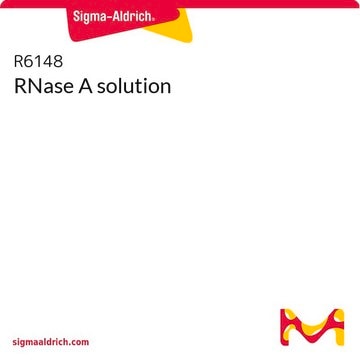NA0100
PhasePrep™ BAC DNA Kit
Scalable method for isolating large-molecular weight plasmids
Sinónimos:
BAC Kit
Iniciar sesiónpara Ver la Fijación de precios por contrato y de la organización
About This Item
UNSPSC Code:
41105501
NACRES:
NA.52
Productos recomendados
General description
The PhasePrep™ BAC DNA Kit offers a scalable and cost-effective method for isolating large-molecular weight plasmids such as Bacterial Artificial Chromosomes (BAC) from recombinant E. coli cultures. The same kit can be used for preparations of four different sizes; sufficient reagents are provided for 300 micro, 180 mini, 30 midi, or 15 maxi preparations. Up to 2,12, 50, or 100 mg of BAC DNA can be recovered from 5, 40, 250, or 500 ml of overnight recombinant E. coli culture, respectively. The purified BAC DNA contains very low levels of endotoxin (£10 EU/mg DNA).
Recombinant E. coli culture is harvested by centrifugation and subjected to a modified alkaline-SDS lysis procedure. Nucleic acid is precipitated from the cleared lysate; residual RNA is removed by a short digestion at elevated temperature with an RNase cocktail. Endotoxins and other impurities are removed by simple temperature-mediated extraction and phase separation. Finally the BAC DNA is selectively precipitated from solution.
Recombinant E. coli culture is harvested by centrifugation and subjected to a modified alkaline-SDS lysis procedure. Nucleic acid is precipitated from the cleared lysate; residual RNA is removed by a short digestion at elevated temperature with an RNase cocktail. Endotoxins and other impurities are removed by simple temperature-mediated extraction and phase separation. Finally the BAC DNA is selectively precipitated from solution.
The PhasePrep BAC DNA Kit offers a scalable and cost-effective method for isolating large-molecular weight plasmids such as Bacterial Artificial Chromosomes (BAC) from recombinant E. coli cultures. The same kit can be used for preparations of four different sizes; sufficient reagents are provided for 300 micro, 180 mini, 30 midi, or 15 maxi preparations. Up to 2,12, 50, or 100 mg of BAC DNA can be recovered from 5, 40, 250, or 500 mL of overnight recombinant E. coli culture, respectively. The purified BAC DNA contains very low levels of endotoxin (≤10 EU/μg DNA).
Recombinant E. coli culture is harvested by centrifugation and subjected to a modified alkaline-SDS lysis procedure. Nucleic acid is precipitated from the cleared lysate; residual RNA is removed by a short digestion at elevated temperature with an RNase cocktail. Endotoxins and other impurities are removed by simple temperature-mediated extraction and phase separation. Finally the BAC DNA is selectively precipitated from solution.
The recovered BAC DNA is predominantly in its super-coiled form, free of RNA contamination, and ready for immediate use in downstream applications, such as sequencing, restriction digestion, cloning, and PCR.
Recombinant E. coli culture is harvested by centrifugation and subjected to a modified alkaline-SDS lysis procedure. Nucleic acid is precipitated from the cleared lysate; residual RNA is removed by a short digestion at elevated temperature with an RNase cocktail. Endotoxins and other impurities are removed by simple temperature-mediated extraction and phase separation. Finally the BAC DNA is selectively precipitated from solution.
The recovered BAC DNA is predominantly in its super-coiled form, free of RNA contamination, and ready for immediate use in downstream applications, such as sequencing, restriction digestion, cloning, and PCR.
Application
PhasePrep™ BAC DNA Kit has been used to isolate bacterial artificial chromosomes.
The recovered BAC DNA is predominantly in its super-coiled form, free of RNA contamination, and ready for immediate use in downstream applications, such as sequencing, restriction digestion, cloning, and PCR.
Features and Benefits
- Typical DNA yields of 2-100 μg from 5-500 mL of overnight cultures
- No phenol/chloroform extraction required
- Allows possible micro to maxi preps with the same kit
- No long waits for drip columns
Other Notes
The PhasePrep™ BAC DNA Kit offers a highly scalable, rapid, cost-effective method for isolating high molecular weight plasmids such as Bacterial Artificial Chromosomes (BACs) from recombinant E. coli cultures.
For additional information, please see www.sigma-aldrich.com/genelutehp.
Legal Information
PhasePrep is a trademark of Sigma-Aldrich Co. LLC
signalword
Danger
hcodes
Hazard Classifications
Eye Irrit. 2 - Met. Corr. 1 - Resp. Sens. 1 - Skin Irrit. 2 - STOT SE 3
target_organs
Central nervous system
Storage Class
8A - Combustible corrosive hazardous materials
flash_point_f
Not applicable
flash_point_c
Not applicable
Certificados de análisis (COA)
Busque Certificados de análisis (COA) introduciendo el número de lote del producto. Los números de lote se encuentran en la etiqueta del producto después de las palabras «Lot» o «Batch»
¿Ya tiene este producto?
Encuentre la documentación para los productos que ha comprado recientemente en la Biblioteca de documentos.
Los clientes también vieron
Evolution and expression of the fructokinase gene family in Saccharum
Yihong Chen
BMC Genomics, 18, 197-197 (2017)
Structure, phylogeny, allelic haplotypes and expression of sucrose transporter gene families in Saccharum
Qing Zhang
BMC Genomics, 17 (2016)
S S Kwek et al.
Oncogene, 28(17), 1892-1903 (2009-03-31)
Co-amplification at chromosomes 8p11-8p12 and 11q12-11q14 occurs often in breast tumors, suggesting possible cooperation between genes in these regions in oncogenesis. We used high-resolution array comparative genomic hybridization (array CGH) to map the minimal amplified regions. The 8p and 11q
Thomas W Marchant et al.
PLoS genetics, 15(5), e1008102-e1008102 (2019-05-17)
In flat-faced dog breeds, air resistance caused by skull conformation is believed to be a major determinant of Brachycephalic Obstructive Airway Syndrome (BOAS). The clinical presentation of BOAS is heterogeneous, suggesting determinants independent of skull conformation contribute to airway disease.
Comparative structural analysis of Bru1 region homeologs in Saccharum spontaneum and S. officinarum
Jisen Zhang
BMC Genomics, 17 (2016)
Nuestro equipo de científicos tiene experiencia en todas las áreas de investigación: Ciencias de la vida, Ciencia de los materiales, Síntesis química, Cromatografía, Analítica y muchas otras.
Póngase en contacto con el Servicio técnico











